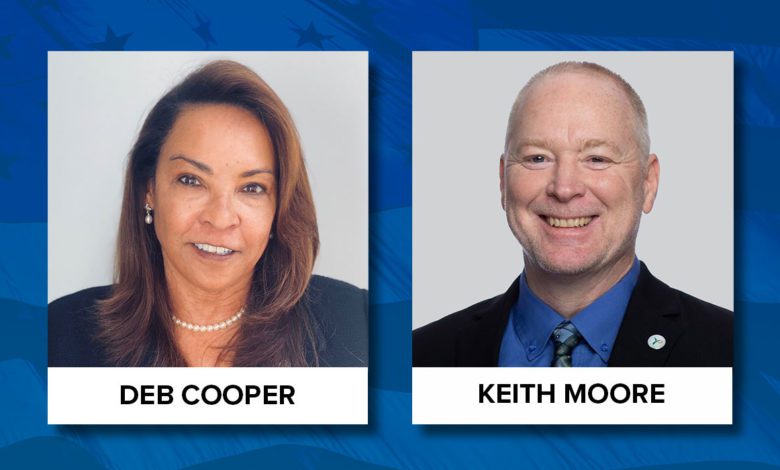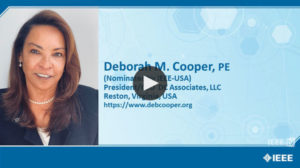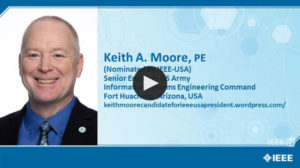
Where do the candidates for 2021 IEEE-USA President-elect stand on the key issues? IEEE-USA InSight recently posed a set of nine questions to candidates Deborah (Deb) Cooper and Keith Moore. Their responses should help you decide how you will vote, when you receive your ballot in August. In addition to this Q&A, you can view recorded video statements from both candidates — as well as other IEEE candidates — at IEEE.tv.
Tell us about yourself and your vision for IEEE-USA.

Deb Cooper: I am president and founder of an independent consulting firm specializing in cybersecurity. I majored in Analytic Philosophy at UCLA, with the intent of pursuing a career in academia. While working on my doctorate degree, I discovered a new passion in computer programming, which led to a career in computer security—the perfect match for my skills in mathematical logic and computing. As an IEEE volunteer, I have always been committed to being responsive to the needs of our members; and to expanding our outreach to include a more diverse and inclusive membership base. My vision for IEEE-USA is broader member outreach to grow membership in the United States; strategic and mutually beneficial partnerships within IEEE, and with external organizations; and remaining proactive in identifying new opportunities.

Keith Moore: My name is Keith Moore; and I was born and raised in Alabama, where I went to college at the University of Alabama in Huntsville. I began my working career at the United States Army Missile Command. My wife and I met in Arizona, while I was travelling for work, and I moved there to be near her family. I have been working at Fort Huachuca for more than 20 years. I have volunteered and worked at every level of IEEE. My vision for IEEE-USA is to continue to serve IEEE members who live and work in the United States, by addressing the unique interests of those members through legislative support and career advancement; and by continuing to address U.S.-specific issues in an agile manner!
What are your strongest personal traits from which IEEE-USA stands to benefit?
Deb: I have been an IEEE volunteer for several decades, at many different levels. I have been a conference organizer, guest editor, Computer Society president, Division director, and MGA treasurer; and a voting member on all the major Boards—except Educational Activities and Standards—and on numerous committees. Throughout my years of volunteer service, I have been committed to making us a better, more responsive and more valued organization for our members. My past and current volunteer activities have provided me with a broad understanding of what has worked in the past; what has not; and how to build successful partnerships across IEEE, and with external organizations. I embrace innovation and prefer a collegial leadership style, working in partnership with staff and volunteers to produce results.
Keith: I have a positive spirit to work with others together to build relationships; address issues with a win-win outlook; advance the careers of members; mentor those who are trying new things; find common grounds across backgrounds, and solve difficulties with the best possible outcomes. IEEE-USA faces a number of important challenges now that will likely continue to grow in the near future. The need for dynamic and proactive decisions for the future of the organization is being pressed upon us by the changing world around us. Leadership that has the spirit of cooperation and rational consideration and collaboration with many viewpoints will be required during these trying times. If elected, I will work to continue to provide that strong but flexible leadership.
What is your favorite aspect of your IEEE-USA involvement?
Deb: I relish working with volunteers who are passionate about making a positive difference. This has been especially true for the work I have done with Regions and Sections, and with outstanding volunteer members of our Young Professionals and Women in Engineering Affiliate groups. It never occurred to me to serve on an IEEE-USA policy committee until I was invited by an IEEE-USA past president. I have served on the Committee on Communications Policy since 2013, and working with fellow volunteers on public policy initiatives has been enlightening and rewarding. Working with fellow volunteers to make a difference is definitely my favorite aspect.
Keith: I enjoy the can-do spirit of IEEE members across the United States. We are a nation of immigrants, so our membership combines many of the best characteristics and experiences from across many cultures. This broad diversity encourages people to work with freedom of action in choosing the best future paths for all of us. IEEE-USA embodies this spirit of liberty that enables fierce independent accomplishment—hand in hand with a willingness to engage in cooperation amongst others. I love that many of our most successful entrepreneurs founded their efforts in basements and garages, and then had the freedom of action to broaden their scope as their ideas took flight. IEEE-USA helps sustain those freedoms in issues that specifically apply to U.S. engineers and technologists.
How should IEEE-USA address the issue of declining membership?
Deb: Overall, total IEEE membership numbers have increased, as revenue from membership dues has declined, due to declines in higher-grade members. Regions 1-6 (IEEE-USA) constitute about half of all higher-grade members; thus, greater decline. This challenge is significant for IEEE-USA, which is financially dependent on higher-grade member assessments. It also affects U.S. Regions and Sections, MGA, Educational Activities, and other parts of IEEE. So, this problem is bigger, and in need of a coordinated and cooperative effort. Several opportunities are worth exploring: investigate alternative membership models; continue to improve recruitment, as has been done in Regions 1-6; and broaden our outreach beyond our historic base. Many students, educators, researchers and professionals in STEM and IT fields do not self-identify as “engineers.”
Keith: IEEE is founded on a simple idea—engineers and technologists working together to advance technology for the benefit of humanity. It is this basic idea of working together for the betterment of our own careers, and the lives of all peoples, that brings us together. We must continue to support activities that encourage and support these ends. If we build it, they will come!
What can be done to help IEEE’s U.S. members become more aware of, and engaged in, IEEE-USA’s public policy activities?
Deb: Increasing the visibility of IEEE-USA’s public policy activities is an important part of increasing IEEE-USA’s visibility. In my volunteer experience across IEEE, limited awareness exists about what IEEE-USA does and why, including public policy advocacy. Several cost-effective ways for spreading the word come to mind, including recorded webinars and online videos advertised at the IEEE website, and at IEEE conferences and meetings websites. IEEE has experienced an exponential increase in attendance for many IEEE virtual events during the COVID-19 restrictions, compared to in-person events. Lastly, it is paramount that IEEE-USA makes members aware they have a voice in IEEE-USA public policy priorities.
Keith: Congressional Visits Day is a wonderful activity that engages our members with their elected officials—to ensure their voices are recognized on issues that affect their careers and technology in the United States. Additional support for attendees to participate in this event, and other similar activities—as well as publishing success stories of how IEEE-USA positively affects the legislative bodies are needful, and will provide greater awareness and engagement!
Is there a need to better understand Young Professionals, so we can more fully meet their needs? If so, what are some of the changes IEEE-USA needs to make to address this demographic?
Deb: IEEE Young Professionals (YPs) was formerly called “Graduates of the Last Decade” (GOLDs). “Last Decade” changed to “last 15 years” with the name change to YP. The characteristics of this demographic have and will continue to change through generations. The needs of young professionals are as different as the needs of other IEEE members, given their career paths (e.g., educators, researchers, practitioners, entrepreneurs, and others). IEEE-USA continues to make YPs a priority focus, working closely with the IEEE YP Affiliate group, as well as collaborating with IEEE Technical and Educational Activities. IEEE-USA engages YPs in policy committees, training and mentoring, and continues to be proactive in understanding and adapting to the needs of young professionals in a rapidly evolving environment.
Keith: Yes, each generation has new and unique ways that they communicate their continually changing needs and interests. We must continue to proactively address the desires of Young Professionals. One of the best ways to meet these changes is to continually bring new Young Professionals into leadership roles, so they will have a direct personal influence on outcomes that best meet the requirements to engage each new age of Young Professionals.
What public policy priorities would IEEE-USA take on under your leadership, and why?
Deb: COVID-19 has demonstrated the importance of STEM R&D funding, ending the “digital divide,” and maintaining a brain trust of engineering capabilities in the United States. However, I believe no single individual should choose IEEE-USA public policy priorities. Value to our members, the profession, the public, and the prospects for influencing government actions should inform IEEE-USA’s public policy priority choices. Consistently being on the wrong side of history erodes credibility. Fortunately, that has not been the case for IEEE-USA—it has successfully taken positions of great benefit, I support. I encourage all U.S. IEEE members to review IEEE-USA’s 2020 public policy priorities, and to provide feedback at: https://ieeeusa.org/public-policy/priorities/.
Keith: IEEE-USA must continue the excellent work it has undertaken to become the trusted advisor for our political representatives. A great way to continue to influence these decisionmakers is the Capitol Hill intern program, where engineers and technologists serve as staffers to research technical topics and provide opinion pieces to our representatives that are rational and well considered. A well organized, grassroots force of IEEE technical expert volunteers—who are willing and able to provide draft, input and review of these very important documents—is an added measure that will ensure broad experiential-based policy is enacted in the United States.
How can IEEE-USA improve career development for IEEE’s U.S. members and other U.S. technical professionals?
Deb: IEEE has recently taken several steps towards improved coordination and cooperation across IEEE. The 2020 IEEE Ad Hoc Committee on Lifelong Learning and Continuing Education, which includes Past IEEE-USA President Tom Coughlin, has surveyed members; and it has proposed several exciting, new ideas currently under consideration. IEEE-USA is collaborating with Region and Section leaders, increasing the production of webinars, and establishing new partnerships. It is incumbent upon IEEE-USA to continue to improve its offerings, keep our members informed, and solicit input and feedback.
Keith: Career development is vital for career advancement. Innovative use of job finding agencies to assist members who are between employers can provide some needed services. Agreements with job agencies to provide access to our opt-in database of IEEE-USA job seekers can be a win-win situation for all parties; and it could garner IEEE-USA additional operating funds from placements. The temporary election of IEEE members to be included in such a one-stop job search aid could be a great boon. Other methods of career development include training, mentoring, and other services. We must continue to explore opportunities to serve members in these areas.
If elected, what actions will you take in your one year as President that will have a significant impact on IEEE-USA’s future?
Deb: My priorities are broadening our outreach to engage a more diverse and inclusive membership base; creating a three- to five-year plan for improving IEEE-USA’s financial future; building strategic partnerships within and outside IEEE; and innovating new member benefits and revenue sources working in partnership.
It is difficult for one individual to make a lasting, significant impact during a one-year term. I have learned this from my many years as a senior volunteer. The most effective approach is to work as a team with all the volunteer leaders and staff. I support the vision of IEEE-USA 2021 President Kate Duncan, and would continue to support her vision, given exigencies. The future and lasting effects of COVID-19 are unknown and unpredictable.
Keith: Establishing the aforementioned initiatives, along with addressing additional measures that come to light during the next year, will ensure IEEE-USA continues to be a valuable resource for our members!
Submit Your Ballot TodayThe deadline to submit your ballot for the 2020 IEEE Annual Election is 1 October by 12 PM ET. Learn more about all of the candidates here. |
Helen Horwitz is an award-winning freelance writer who lives in Albuquerque, N.M. She was with IEEE from 1991 through 2011, the first nine as Staff Director, IEEE Corporate Communications.






